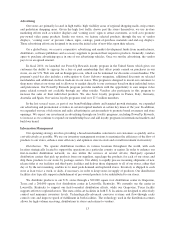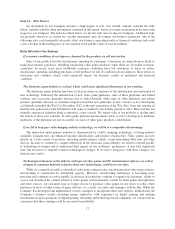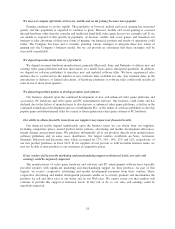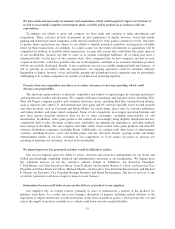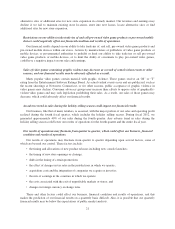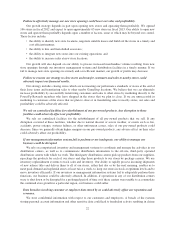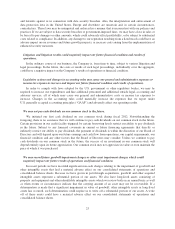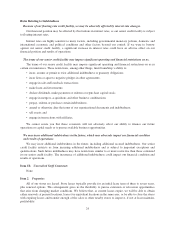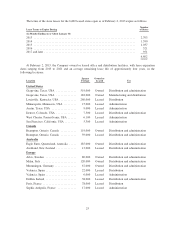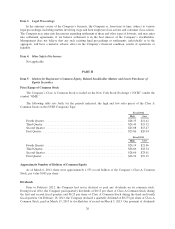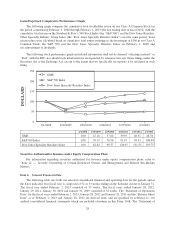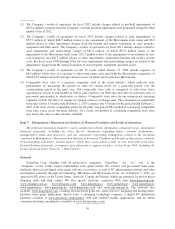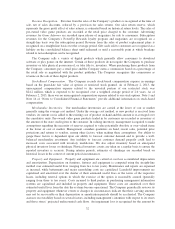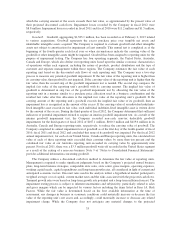GameStop 2012 Annual Report Download - page 38
Download and view the complete annual report
Please find page 38 of the 2012 GameStop annual report below. You can navigate through the pages in the report by either clicking on the pages listed below, or by using the keyword search tool below to find specific information within the annual report.and lawsuits against us in connection with data security breaches. Also, the interpretation and enforcement of
data protection laws in the United States, Europe and elsewhere are uncertain and, in certain circumstances,
contradictory. These laws may be interpreted and enforced in a manner that is inconsistent with our policies and
practices. If we are subject to data security breaches or government-imposed fines, we may have a loss in sales or
be forced to pay damages or other amounts, which could adversely affect profitability, or be subject to substantial
costs related to compliance. In addition, any damage to our reputation resulting from a data breach could have an
adverse impact on our revenues and future growth prospects, or increase costs arising from the implementation of
enhanced security measures.
Litigation and litigation results could negatively impact our future financial condition and results of
operations.
In the ordinary course of our business, the Company is, from time to time, subject to various litigation and
legal proceedings. In the future, the costs or results of such legal proceedings, individually or in the aggregate,
could have a negative impact on the Company’s results of operations or financial condition.
Legislative actions and changes in accounting rules may cause our general and administrative expenses or
income tax expense to increase and impact our future financial condition and results of operations.
In order to comply with laws adopted by the U.S. government or other regulatory bodies, we may be
required to increase our expenditures and hire additional personnel and additional outside legal, accounting and
advisory services, all of which may cause our general and administrative costs or income tax expenses to
increase. Changes in the accounting rules could materially increase the expenses that we report under
U.S. generally accepted accounting principles (“GAAP”) and adversely affect our operating results.
We may not pay cash dividends on our common stock in the future.
We initiated our first cash dividend on our common stock during fiscal 2012. Notwithstanding the
foregoing, there is no assurance that we will continue to pay cash dividends on our common stock in the future.
Certain provisions in our credit facility triggered by certain borrowing levels restrict our ability to pay dividends
in the future. Subject to any financial covenants in current or future financing agreements that directly or
indirectly restrict our ability to pay dividends, the payment of dividends is within the discretion of our Board of
Directors and will depend upon our future earnings and cash flow from operations, our capital requirements, our
financial condition and any other factors that the Board of Directors may consider. Unless we continue to pay
cash dividends on our common stock in the future, the success of an investment in our common stock will
depend entirely upon its future appreciation. Our common stock may not appreciate in value or even maintain the
price at which it was purchased.
We may record future goodwill impairment charges or other asset impairment charges which could
negatively impact our future results of operations and financial condition.
In recent periods we have recorded significant non-cash charges relating to the impairment of goodwill and
other intangible assets that had a material adverse effect on our consolidated statements of operations and
consolidated balance sheets. Because we have grown in part through acquisitions, goodwill and other acquired
intangible assets represent a substantial portion of our assets. We also have long-lived assets consisting of
property and equipment and other identifiable intangible assets which we review both on an annual basis as well
as when events or circumstances indicate that the carrying amount of an asset may not be recoverable. If a
determination is made that a significant impairment in value of goodwill, other intangible assets or long-lived
assets has occurred, such determination could require us to write off a substantial portion of our assets. A write
off of these assets could have a material adverse effect on our consolidated statements of operations and
consolidated balance sheets.
23


